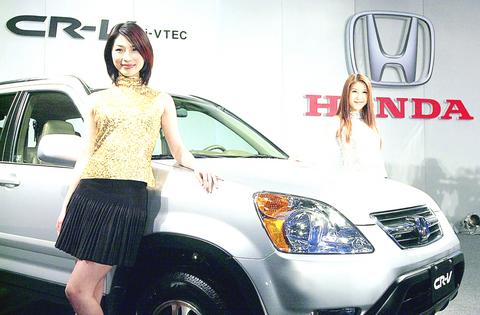Honda Motor Co, Japan's second-largest automaker, launched a new sports-utility vehicle (SUV) in Taiwan yesterday, striving to regain customers in a market it temporarily pulled out of last year.
Honda severed a 41-year partnership with local partner Sanyang Industry Co (
The Taiwan arm of Honda aims to sell 10,000 CR-V SUVs this year, as it tries to take advantage of growing sales in the sector, said Wey Gow-jhy (

PHOTO: GEORGE TSORNG, TAIPEI TIMES
Taiwan is the seventh country to produce CR-Vs, Hiroyuki Yoshino (
Sales of recreational vehicles in Taiwan accounted for 15.8 percent of domestic market sales last year, according to York Chen (
Domestic sales of new vehicles hit 398,877 units last year, up 14.8 percent year-on-year.
That segment is expected to expand to 25 percent of the market over the next few years, Chen said. Ford sold around 15,000 Escape SUVs last year and just launched a new 3-liter, four-wheel-drive Escape earlier this month.
The first locally assembled CR-V rolled off the production line in Pingtung on Monday. The automaker will start selling the two-wheel-drive models at NT$719,000 and four-wheel-drive models up to NT$869,000.
But Honda still lags far behind the market leaders in Taiwan. Last year, Toyota Motor Corp sold 100,531 vehicles here, commanding 25.2 percent of the market, and Mitsubishi Motors Corp sold 99,334 vehicles, or 24.9 percent.
The Honda factory is also relatively small compared to its rivals such as Kuozui Motors Ltd (國瑞), China Motor Corp (中華) and Yulon Motor Co (裕隆), which produced between 50,000 and 100,000 cars annually. Kuozui produces Toyotas, China Motor assembles Mitsubishis, and Yulon manufactures Nissans.
According to Chen Chuan-lion (
Still, Honda remains confident in the local market and plans to introduce its new models later this year, Honda Taiwan President Teruo Fujisaki (
But according to company sources, the automaker may introduce one of the two models -- the Accord sedan or Fit compact car -- sometime in the second half of the year. The company has five dealerships in Taiwan and is expected to have 19 outlets by June and 30 by December.
"We hope to have a sales network of 40 outlets by the end of 2004," Fujisaki said.

SEEKING CLARITY: Washington should not adopt measures that create uncertainties for ‘existing semiconductor investments,’ TSMC said referring to its US$165 billion in the US Taiwan Semiconductor Manufacturing Co (TSMC, 台積電) told the US that any future tariffs on Taiwanese semiconductors could reduce demand for chips and derail its pledge to increase its investment in Arizona. “New import restrictions could jeopardize current US leadership in the competitive technology industry and create uncertainties for many committed semiconductor capital projects in the US, including TSMC Arizona’s significant investment plan in Phoenix,” the chipmaker wrote in a letter to the US Department of Commerce. TSMC issued the warning in response to a solicitation for comments by the department on a possible tariff on semiconductor imports by US President Donald Trump’s

‘FAILED EXPORT CONTROLS’: Jensen Huang said that Washington should maximize the speed of AI diffusion, because not doing so would give competitors an advantage Nvidia Corp cofounder and chief executive officer Jensen Huang (黃仁勳) yesterday criticized the US government’s restrictions on exports of artificial intelligence (AI) chips to China, saying that the policy was a failure and would only spur China to accelerate AI development. The export controls gave China the spirit, motivation and government support to accelerate AI development, Huang told reporters at the Computex trade show in Taipei. The competition in China is already intense, given its strong software capabilities, extensive technology ecosystems and work efficiency, he said. “All in all, the export controls were a failure. The facts would suggest it,” he said. “The US

The government has launched a three-pronged strategy to attract local and international talent, aiming to position Taiwan as a new global hub following Nvidia Corp’s announcement that it has chosen Taipei as the site of its Taiwan headquarters. Nvidia cofounder and CEO Jensen Huang (黃仁勳) on Monday last week announced during his keynote speech at the Computex trade show in Taipei that the Nvidia Constellation, the company’s planned Taiwan headquarters, would be located in the Beitou-Shilin Technology Park (北投士林科技園區) in Taipei. Huang’s decision to establish a base in Taiwan is “primarily due to Taiwan’s talent pool and its strength in the semiconductor

French President Emmanuel Macron has expressed gratitude to Hon Hai Precision Industry Co (鴻海精密) for its plan to invest approximately 250 million euros (US$278 million) in a joint venture in France focused on the semiconductor and space industries. On his official X account on Tuesday, Macron thanked Hon Hai, also known globally as Foxconn Technology Group (富士康科技集團), for its investment projects announced at Choose France, a flagship economic summit held on Monday to attract foreign investment. In the post, Macron included a GIF displaying the national flag of the Republic of China (Taiwan), as he did for other foreign investors, including China-based